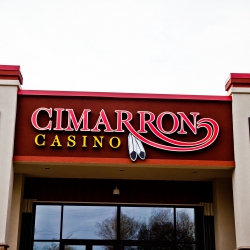
The Iowa Tribe of Oklahoma faces an uphill legal battle, but if it was successful, it would change the face of American online gambling.
The Iowa Tribe of Oklahoma has a case pending in a U.S. District Court which could change the nature of online gambling in the United States. The tribe is asking for a certification of an earlier appellate judge’s opinion that online gambling from servers on a Native American reservation were legal under federal law.
On a micro scale, if the US judge confirmed the earlier decision, it would allow the Iowa Tribe to accept real money wagers from international gamblers. The implication is any of the 240+ Indian casinos in the United States would have the ability to launch internationally-facing websites for online gambling.
Judge Charles Chapel’s Ruling
On November 24 of this year, retired Oklahoma Criminal Court of Appeal judge Charles Chapel (acting as an arbitrator) issued an opinion stating that the Iowa Tribe’s online site, which is hosted on servers located on the Iowa reservation, had the legal right to accept real money play from gamblers outside the United States. Judge Chapel’s decision is based on the same U.S. Supreme Court decision which gives Native Americans the right to have brick-and-mortar casinos on their reservations: the 1987 California vs. Cabazon Band of Mission Indians.
In that case, the Supreme Court ruled that Native American tribes which signed treaties with the US federal government owned sovereign territory, because they had been recognized as sovereign by the United States. Thus, the Indians could host land-based gaming on their reservations, if they so chose. The one stipulation was they had to come to a gaming compact with the state the reservations was located inside.
This provided a legal gray area to individual states. They could ban gambling throughout most of their state, but use the compact stipulation to negotiate tax revenues from the Indian casinos. For the reservation Indians, the casinos provided a source of income on lands which often were less-than-ideal for agriculture or developments. Thus, California vs. Cabazon was a win-win for tribes and states alike.
Internet Does Not Change the Compact’s Basic Terms
If Judge Chapel’s decision is confirmed, then the sovereignty of a reservation would apply to international commerce, too. The Iowa Tribe of Oklahoma would be able to circumvent US federal law, because the transactions would be taking place between residents of two non-American sovereign authorities. It’s a ruling complicated by the fact such transactions “pass over” U.S. territory, when they happen.
Charles Chapel said the compact allowed for the possibility of online gambling. In his opinion, he wrote that online gambling was “merely using technology to play covered games“, and that technology did not “extend or restrict the scope of the games and does not amend the compact in any way.”
Essentially, online software simply provided another way to play games already covered in the compact.
Department of Interior Bars the Way
That is a much different opinion than the one held by the US Department of Interior, which challenged two Oklahoma tribes, the Cheyenne and Arapaho tribes, when they tried to launch similar online casino (PokerTribes.com) in 2013. The Interior Department banned the site from operation, saying it violated both the gaming compact with Oklahoma and the federal Indian Gaming Regulatory Act. That ban led to a lawsuit by the Cheyenne and Arapaho tribes in 2013.
The case never was heard by a judge, because the Cheyenne and Arapaho tribes had a leadership election which brought new leaders to the tribe. Those leaders chose to drop the court case when they came to power.
Bobby Walkup’s Plan
Now, the Iowa Tribe of Oklahoma’s leader, Bobby Walkup, has asked for a US District Court Judge in Oklahoma City to certify Charles Chapel’s ruling. If successful, the tribe would launch a website named Pokertribe.com, which would off poker-only at first. Eventually, Bobby Walkup hopes to expand the site to include online slots, blackjack, baccarat, pull-tabs, and bingo.
The software provider for the PokerTribe website would be Universal Entertainment Group (UEG), a Florida company not well-known in the online gambling industry. According to one prominent online gaming website, UEG reached a $4.2 million settlement with the Federal Trade Commission for “deceptive telemarketing” in 2011. In an interview with The Oklahoman recently, UEG CEO Isaias Almir said his company could launch the PokerTribe site “in a few weeks”, if it was approved.
Implications of the Case
It is an interesting legal sidenote for now, because most experts believe the Iowa Tribe’s legal challenge won’t be successful. If it is, expect to see a bevy of Native American tribal gaming authorities launch their own gaming portals. One has to imagine the Cheyenne and Arapaho tribes might give another try. Foxwoods Casino and Mohegan Sun already have free-to-play online casino sites, so they could turn those operations into real money sites quickly. The California-based Pechanga website is seemingly ubiquitous, so it would be well-placed in a new online tribal gaming industry.
